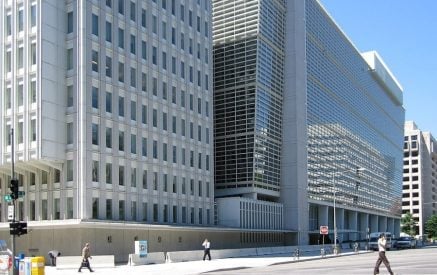Significant impacts in Central Asia, Russia, and Western Balkans
Dramatic climate changes and weather extremes already affecting millions of lives, but solutions exist
WASHINGTON, November 23, 2014 – As the planet warms further, heat-waves and other weather extremes that today occur once in hundreds of years, if ever, would become the “new climate normal,” creating a world of increased risks and instability. The consequences for development would be severe as crop yields decline, water resources shift, sea-levels rise, and the livelihoods of millions of people are put at risk, according to a new scientific report released today by the World Bank Group.
In parts of Central Asia and the Western Balkans specifically, unprecedented heat extremes could occur in over 60 percent of summer months and drought risk could increase by 20 percent in a 4°C warmer world, the report finds. At the same time, projections suggest an increase in riverine flood risk, mainly in spring and winter, due to more intense snow melt in spring and heavier rainfall in the winter months.
Read also
Climate change impacts such as extreme heat events may now be unavoidable because the Earth’s atmospheric system is locked into warming close to 1.5°C above pre-industrial levels by mid-century, the report said. Even very ambitious mitigation action taken today will not change this, it said.
“Today’s report confirms what scientists have been saying – past emissions have set an unavoidable course to warming over the next two decades, which will affect the world’s poorest and most vulnerable people the most,” said Jim Yong Kim, President of the World Bank Group. “We’re already seeing record-breaking temperatures occurring more frequently, rainfall increasing in intensity in some places, and drought-prone regions like the Mediterranean becoming drier.”
“These changes make it more difficult to reduce poverty and put in jeopardy the livelihoods of millions of people,” Kim said. “They also have serious consequences for development budgets, and for institutions like the World Bank Group, where our investments, support and advice must now also build resilience and help affected populations adapt.”
Dramatic climate changes and weather extremes are already affecting people around the world, damaging crops and coastlines, and putting water security at risk, according to the report, Turn Down the Heat: Confronting the New Climate Normal. Many of the worst projected climate impacts could still be avoided by holding warming below 2°C, the report said.
“The good news is that we can take action that reduces the rate of climate change and promotes economic growth, ultimately stopping our journey down this dangerous path,” Kim said. “World leaders and policy makers should embrace affordable solutions like carbon pricing and policy choices that shift investment to clean public transport, cleaner energy and more energy efficient factories, buildings and appliances.”
Turn Down the Heat: Confronting the New Climate Normal is an analysis of likely impacts of present day (0.8°C), 2°C and 4°C warming above pre-industrial levels on agricultural production, water resources, ecosystem services, and coastal vulnerability across Latin-America and the Caribbean, Middle East and North Africa, and parts of Europe and Central Asia. It builds on a 2012 Bank report, which concluded the world would warm by 4 degrees Celsius[1] above pre-industrial levels by the end of this century if we did not take concerted action immediately.
The report, prepared for the World Bank Group by the Potsdam Institute for Climate Impact Research and Climate Analytics, reveals how rising global temperatures are increasingly threatening the health and livelihoods of the most vulnerable populations, crucially magnifying problems each region is struggling with today.
A common threat across the three regions is the risks posed by heat extremes. State‐of‐the‐art climate modeling shows that “highly unusual” heat extremes, similar to the heat-waves experienced in the US in 2012 and Russia and Central Asia in 2010, increase rapidly under a 4°C emission pathway.
It also reveals that the risks of reduced crop yields and production losses for the regions studied increase significantly above 1.5°C to 2°C warming. It notes that declines in agricultural productivity will also have impacts outside core producer regions, with strong repercussions on food security, and may negatively affect economic growth and development, social stability and well‐being.
Key findings across the regions include:
- Latin America and the Caribbean: Heat extremes and changing precipitation patterns will have adverse effects on agricultural productivity, hydrological regimes and biodiversity. In Brazil, without additional adaptation, crop yields could decrease by up to 70 percent for soybean and up to 50 percent for wheat at 2°C warming by 2050. Ocean acidification, sea level rise, tropical cyclones and temperature changes will impact coastal livelihoods, tourism, health, food and water security, particularly in the Caribbean. Melting glaciers would be a hazard for Andean cities.
- Middle East and North Africa: A large increase in heat-waves combined with warmer average temperatures will put intense pressure on already scarce water resources, with major consequences for human consumption and regional food security. In Jordan, Egypt, and Libya, crop yields could decrease by up to 30 percent at 1.5 to 2°C warming by 2050. Migration and climate‐related pressure on resources may also increase the risk of conflict.
- Western Balkans and Central Asia: Reduced water availability in some places will become a threat as increases in temperatures head toward 4°C. Melting glaciers in Central Asia and shifts in the timing of water flows will reduce the amount of water available in summer months and increase the risk of torrential floods. In the Western Balkans, climate extremes will pose major risks to agricultural systems, energy, and human health. A 2°C warming would already entail significant impacts, such as in Macedonia where yield losses are projected up to 50 percent for maize, wheat, vegetables and grapes by 2050.
The report also warns that, if warming continues unabated, irreversible changes on a large scale could be triggered. In northern Russia, forest dieback and thawing of permafrost threaten to amplify global warming as stored carbon and methane are released into the atmosphere, giving rise to a self-amplifying feedback loop. Methane emissions could increase by 20 to 30 percent across Russia at 2°C warming by 2050.
Laura Tuck, World Bank Vice President for Europe and Central Asia, said, “From the Western Balkans to Siberia, from Europe to Central Asia, the impacts of extreme climate events, such as floods, droughts, and forest fires, are already being felt, all with significant human and economic cost, as well as environmental impact. Across the Europe and Central Asia region, countries are requesting our assistance to reduce vulnerability to climate change and move towards climate-smart development. For example, we are supporting Romania in operationalizing its national climate change strategy. We are working with Serbia and Bosnia Herzegovina following the devastating floods that hit earlier this year to strengthen their disaster response preparedness and disaster recovery capacity. We are also working with the Russian Federation to improve forest fire prevention; and we are supporting the countries of Central Asia to establish regional collaboration to enhance climate resilience.”
“The report makes crystal clear that we cannot continue down the current path of unchecked, growing emissions. Leaders must step up and take the necessary decisions on how we manage our economies towards clean growth and resilient development,” said Rachel Kyte, World Bank Group Vice President and Special Envoy for Climate Change. “Urgent and substantial technological, economic, institutional and behavioral change is needed to reverse present trends. Economic development and climate protection can be complementary. We need the political will to make this happen.”
World Bank
























































